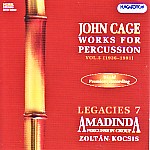There’s really no way to “review” John Cage’s “number” pieces, since they leave so much open to chance and it’s impossible to say what they are supposed to sound like, or if the performance accurately reflects Cage’s intentions. Anyone who pretends otherwise is simply blowing hot air, so let’s just say that if you are collecting this cycle of works and need One, Three, and Six, here they are, obviously well-played and very well recorded. The two works containing actual music as it’s generally understood, Quartet and Dance Music, are in fact quite charming and full of curious sounds (including “found” instruments and a toy piano). No less then Zoltan Kocsis lends his considerable keyboard prowess to the latter. Indeed, Dance Music (1940), which was discovered only recently, is billed as a world-premiere recording. The music is delightfully mischievous, rather like a cross between Ives in populist mode and some lost piece of Les Six. So if you’re a Cage collector, don’t hesitate for a minute. And if you’re just curious, this disc actually gives an excellent sense of his range of interests, containing as it does music from both ends of his long career (1936 to 1991). [3/31/2008]
































